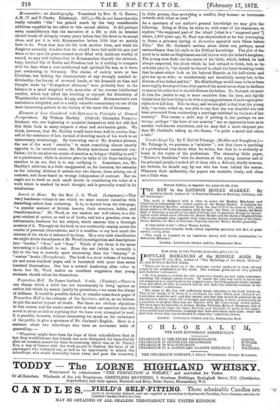Tregarthen Hall. By James Garland. 3 vols. (Tinsley).—There is one
charge which a critic has not uncommonly to bring against an author, but which he cannot justify by quotations,—we mean the charge of dullness. It would be possible, indeed, to transfer some dozen pages of Tregarthen Hall to the columns of the Spectator, and so, as we believe, to put tho matter beyond all doubt. But there are obvious objections to this coarse, and the reader must take on trust our assertion that this novel is about ad dull as anything that we have ever attempted to read. It is possible, however, without trespassing too much on the endurance of the public, to give a specimen of Mr. Garland's English. Here is a sentence about two schoolboys who have an inveterate habit of quarrelling:— "Whatever might have been the hope of their schoolfellows that at last they would become fast friends was soon dissipated, for immediately after an occasion passed for their fraternizing, which was on St. Peter's Eve, a day of licence with the work-people to blacken the faces of all
• passengers who ventured out, as well as an opportunity to attack the schoolboys, who would invariably break rules, and pace the causeway in little groups, thus provoking a conflict, they became as inveterate towards each other as ever."
As a specimen of our author's general knowledge we may give the following. Being at Malta, he takes us, with some of his characters, to. explore "the supposed part of the island [what is a "supposed part "3 where, 1,800 years ago, St. Paul was shipwrecked as he was journeying to Rome a prisoner, having in Jerusalem appealed unto Cesar before• Felix." But Mr. Garland's notions about ethics are, perhaps, more extraordinary than his style or his Biblical knowledge. The plot of the- novel is to make an illegitimate son fall in love with his father's daughter.. The young man finds out the secret of his birth, which, indeed, he had always suspected, but about which he had refused to think, lest, as he- artlessly puts it, "he should be forced to admit the heart-breaking truth that he must either look on his beloved Blanche as his half-sister, and give her up as wife ; or clandestinely and deceitfully marry her, to the• distress of her father and his." His filial feelings would seem to have been. more highly developed than other parts of his moral sense when he deolinee to marry his sister lest it should distress his father. Mr. Garland, we must do him the justice to say, is more sensitive than his hero, and rightly thinks that the best thing to do with a young gentleman of such vague prin- ciples is to kill him. This he does, and we are glad to find that the young lady, "as time rolled on, was able to say that she was thankful she had been prevented from contracting a marriage inhibited by the laws of her country." This seems a mild way of putting it, but perhaps we are wrong; perhaps " the laws of our country" are as oppressive here as its another well-known restriction, and we may find a more eloquent pen than Mr. Garland's taking up this theme, " to point a moral and adorn a tale."


































 Previous page
Previous page